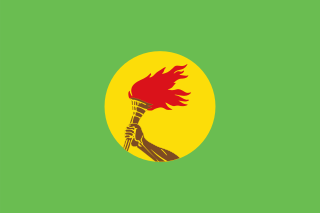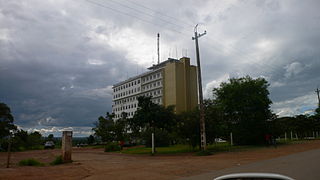| |||||
| Decades: | |||||
|---|---|---|---|---|---|
| See also: | History of Zaire | ||||
The following lists events that happened during 1980 in Zaire .
| |||||
| Decades: | |||||
|---|---|---|---|---|---|
| See also: | History of Zaire | ||||
The following lists events that happened during 1980 in Zaire .
| Date | event |
|---|---|
| 16 February | Solar eclipse of February 16, 1980 causes total darkness in some parts of Zaire |
| 27 August | Jean Nguza Karl-i-Bond is appointed prime minister. |

Zaire, officially the Republic of Zaire, was the name of the Democratic Republic of the Congo from 1965 to 1997. Zaire was located in Central Africa and was, by area, the third-largest country in Africa, and the 11th-largest country in the world. With a population of over 23 million inhabitants, Zaire was the most populous officially Francophone country in Africa, as well as one of the most populous in Africa.

Mobutu Sese Seko Kuku Ngbendu wa za Banga, commonly known as Mobutu Sese Seko or simply just Mobutu, was a Congolese politician and military officer who was the president of Zaire from 1965 to 1997. He also served as Chairman of the Organisation of African Unity from 1967 to 1968. During the Congo Crisis, Mobutu, serving as Chief of Staff of the Army and supported by Belgium and the United States, deposed the democratically elected government of left-wing nationalist Patrice Lumumba in 1960. Mobutu installed a government that arranged for Lumumba's execution in 1961, and continued to lead the country's armed forces until he took power directly in a second coup in 1965.

Zaire is one of the 18 provinces of Angola. It occupies 40,130 square kilometres (15,490 sq mi) in the north west of the country and had a population of 594,428 inhabitants in 2014. It is bordered on the west by the Atlantic Ocean, on the north by the Democratic Republic of Congo, on the east by the Uíge Province, and on the south by the Bengo Province.

The DR Congo national football team, recognised by FIFA as Congo DR, represents the Democratic Republic of the Congo in men's international football and it is controlled by the Congolese Association Football Federation. They are nicknamed Les Léopards, meaning: The Leopards. The team is a member of FIFA and the Confederation of African Football (CAF).

The First Congo War (1996–1997), also nicknamed Africa's First World War, was a civil war and international military conflict which took place mostly in Zaire, with major spillovers into Sudan and Uganda. The conflict culminated in a foreign invasion that replaced Zairean president Mobutu Sese Seko with the rebel leader Laurent-Désiré Kabila. Kabila's unstable government subsequently came into conflict with his allies, setting the stage for the Second Congo War in 1998–2003.

The University of Lubumbashi, also known by the acronym UNILU, is one of the largest universities in the Democratic Republic of the Congo. It is located in Lubumbashi in Haut-Katanga Province, previously Katanga Province. The campus is located in the northern part of the city, west of the airport.

Shaba I was a conflict in Zaire's Shaba (Katanga) Province lasting from 8 March to 26 May 1977. The conflict began when the Front for the National Liberation of the Congo (FNLC), a group of about 2,000 Katangan Congolese soldiers who were veterans of the Congo Crisis, the Angolan War of Independence, and the Angolan Civil War, crossed the border into Shaba from Angola. The FNLC made quick progress through the region because of the sympathizing locals and the disorganization of the Zairian military. Travelling east from Zaire's border with Angola, the rebels reached Mutshatsha, a small town near the key mining town of Kolwezi.
Mobutu Sese Seko's foreign policy emphasized his alliance with the United States and the Western world while supposedly maintaining a non-aligned position in international affairs. Mobutu ruled the Republic of the Congo and then Zaire as president for 32 years, from 1965 to 1997.
The Province of the Anglican Church of the Congo is a province of the Anglican Communion, stretching over the Democratic Republic of the Congo and the Republic of the Congo.

Democratic Republic of the Congo–United States relations are the international relations between the Democratic Republic of the Congo and the United States of America.
The Zaire Use, also called Zairean Rite, officially the Roman Missal for the Dioceses of Zaire, is a Congolese liturgical use of the Roman Rite within the Catholic Church. Approved by the Vatican in 1988, it contains many elements from the Ordinary Form of the Roman Rite, but also incorporates elements from sub-Saharan African culture, particularly Congolese, including a number of inculturated liturgical modifications.
Zaire 74 was a three-day live music festival that took place on 22 to 24 September 1974 at the Stade du 20 Mai in Kinshasa, Zaire. The concert, conceived by South African trumpeter Hugh Masekela and record producer Stewart Levine, was meant to be a major promotional event for the heavyweight boxing championship match between Muhammad Ali and George Foreman, known as The Rumble in the Jungle. When an injury forced Foreman to postpone the fight by six weeks, the festival's intended audience of international tourists was all but eliminated and Levine had to decide whether or not to cancel the event. The decision was made to move forward, and 80,000 people attended.

Zaire ebolavirus, more commonly known as Ebola virus, is one of six known species within the genus Ebolavirus. Four of the six known ebolaviruses, including EBOV, cause a severe and often fatal hemorrhagic fever in humans and other mammals, known as Ebola virus disease (EVD). Ebola virus has caused the majority of human deaths from EVD, and was the cause of the 2013–2016 epidemic in western Africa, which resulted in at least 28,646 suspected cases and 11,323 confirmed deaths.

Malik Jamaal Zaire is an American media personality and former collegiate football quarterback. He currently works for the sports media company Overtime as on-air talent and as a producer, as well as a color commentator for college football games on the CBS Sports Network. He played college football at Notre Dame, before transferring to Florida as a graduate transfer.
The following lists events that happened during 1979 in Zaire.
The following lists events that happened during 1994 in Zaire.
The following lists events that happened during 1974 in Zaire.
The Military ranks of Zaire were the military insignia used by the Zairian Armed Forces. The ranks are based on the Belgian military ranks, with additional influence from France and the United States. Following the overthrow of Mobutu Sese Seko, the ranks were replaced by the military ranks of the Democratic Republic of the Congo.

This article provides details of international football games played by the Zaire national football team from 1971 to 1997, when the Democratic Republic of the Congo was named Zaire.